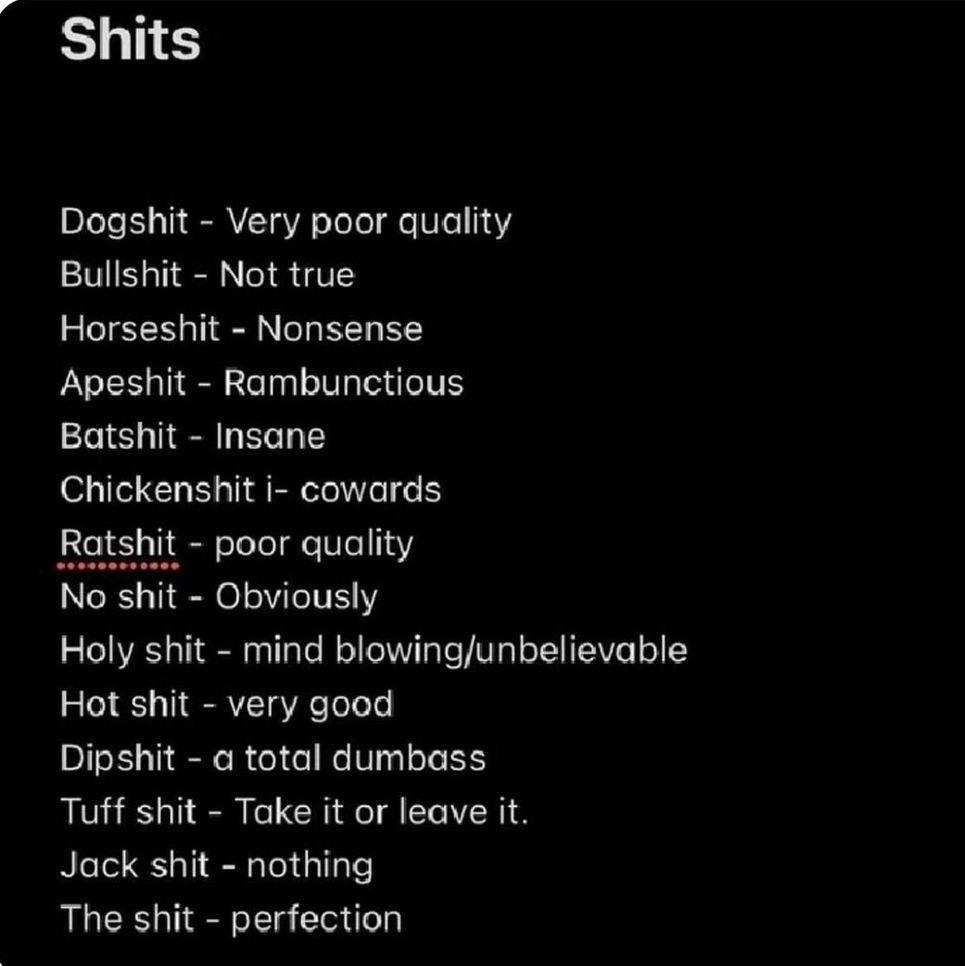When someone is “shit”… That’s bad
When someone “ain’t shit”… That’s also bad
When someone is “the shit”… That’s good!
???
Please help
First you have an association of anything bad with excrements. This is cross-linguistically fairly common, and really old*.
From that “shit = bad” meaning, you got semantic amelioration generating the “the shit = the best”. English slang does this fairly often; refer to “sick”, “dope”, “wicked” doing the same. I’m not sure but I think that the underlying process is:
- “shit” as “extremely bad” →
- “shit” as “notably, outstandingly bad” →
- “shit” as “notable, outstanding” →
- “shit” as “noteworthy, good”
That also explains why “it ain’t shit” is generally negative - it conveys “it isn’t noteworthy”.
*It’s so old that one of Martial’s Epigrams (liber III, epigram 17), in 1st century Latin, already shows this:
Circumlata diu mensis scribilita secundis urebat nimio saeva calore manus; sed magis ardebat Sabidi gula: protinus ergo sufflavit buccis terque quaterque suis. illa quidem tepuit digitosque admittere visa est, sed nemo potuit tangere: merda fuit.
A tart [scribilita], passed and passed around at dessert, cruelly burnt our hands with its excessive heat. But Sabidius’ greed was more fiery still; so forthwith he blew on it with his cheeks three or four times. The tart cooled to be sure, and seemed ready to admit our fingers, but nobody could touch it. It was filth.
I’m copypasting the translation out of laziness, but… it is not accurate. “Merda” is not just filth, it’s literally “shit” - and it’s metaphoric as you’d use in English “that cheesecake was shit”, same shit here.
Fucking well done comment, sir. Thank you
That comment is the shit!
Huh, I always thought “ain’t shit” comes from “this is so bad, it ain’t even shit”. Was probably just my personal take to explain it.
This won’t help, but it’s fun: https://youtu.be/igh9iO5BxBo?si=oyLAwhvrhsR4FHSZ
I’mma click, removing Google’s tracker first
Oh yeah this guy he’s good!
ISMO is awesome.
He’s the shit.
Beat me to it. Perfect for this post.
Saw the question and thought of exactly this video. Great skit.
Bad words just become extreme. The modify the emotion. They often don’t mean anything literally. You have to look for other clues or just memorize the terms.
Words don’t all have meaning in isolation. :) The examples you give just have meaning based on the combination of words.
A bit like letters. We don’t think “r” is contradictory because in “fart” it describes something foul and it “tart” it describes somerthing tasty.
TL;DR: swear words like “shit” usually emphasize the mood of a sentence rather than add new meaning, which is why “shit” seems to change connotation across your examples. Think like the word “very”.
Traditionally in most European languages, the cycle of what is considered most offensive shifts between bodily functions (shit, piss), genitalia and sexual acts (cunt, cock, fuck) and religious profanity (hell, bloody), particularly against the Christian God. Some scholars define us as moving into a new cycle, where the most offensive words are slurs based on race, sexuality, or gender. These scholars speculate that this results in more willingness to experiment with already existing swear words of the ‘traditional’ categories since they are considered less offensive in comparison.
Swear words are almost always used euphemistically and in set phrases. Some scholars go as far as to argue that swearing is only euphemistic and words used literally do not count as “swearing”. In fact, much of swear word usage can be classified as an intensifier, which is a word or short phrase that sort of heightens the already existing mood of the sentence but doesn’t explicitly change the meaning. Using shit as an example, “Shit, the bread’s gone stale again.” In this example, you can also see shit being used as a sort of mood marker, since it is reasonable to assume out of context that the bread going stale might be desirable to the speaker. In this case, the “shit” marks the stale bread is actually bad as well as intensifying the mood as compared to, say “oh darn, the bread’s gone stale again.”
This part is a bit of speculation on the origin of set phrases like “ain’t shit” or “the shit” and I haven’t actually read any scholarly literature on this topic specifically. You can see similarities between set phrases like “this is the shit” and “this is the stuff” and “that’s the spot”. It seems like this is a construction common in the English language to express that something is pleasurable. Whether this is what caused the “this is the shit” set phrase or whether the “this is the shit” set phrase caused the construction remains to be seen. “Ain’t shit” is definitely somewhat different because it probably comes from African American Vernacular English (AAVE). While I would argue that “the shit” could be AAVE in origin as well, I do think it has roots in non AAVE English, whereas “ain’t shit” is grammatically AAVE.
If you’re interested in reading more, I recommend The F Word by Jesse Sheidlower and Holy Sh*t by Melissa Mohr.
Their tone or inflection as well as context and social ques are important qualities to distinguish the intent.
Additionally, there are many idioms that you’ll just need to know to properly get it. (You can think of idioms like kanji or memes if that helps.)
I think they are pronounced shitiodms.
Shieeet: amazed, wow
Nice shit: good stuff
No shit: obvious
Holy shit: surprise
It’s a swiss army knife of english word. Actually it’s rather similar with mandarin, a single word alone mean something, adding different word front or behind will change its meaning.
For example, 害(haì) can mean something bad or harmful or causation, 害怕(haì pà) mean scared or fearful, while 厉害(lì haì) mean something awesome or incredible, and 受害者(shòu haì zhě) mean victim

I would add:
Shit head: a negative term for a person who likely is toxic or caustic for other negative reasons
Shitter: a person who may enjoy shit head humor. One who shit is not necessarily negative like shit head. Could be used to casually downplay a type of humor (lightly positive) or to dismiss a type of behavior (lightly negative)
There’s also “enshittification”, which has an entire Wikipedia article solely about it. Everyone has heard about it at this point.
When it comes to the mess that history has made of English, Susie Dent should be sought for guidance.
The difference between shit and shite
Kevin Bridges
And don’t forget the division. A piece of shit, is bad, like a car that won’t start, or a selfish person. A big piece of shit or a huge piece of shit is worse, but it’s never a whole shit, because then it would be The shit, and good.
How about horseshit, apeshit, batshit, dogshit, and probably lots more. Each of these has a pretty specific use case
Not to mention bullshit.
This is more related to the definite vs indefinite article (the vs a) and how that changes meaning in English.














